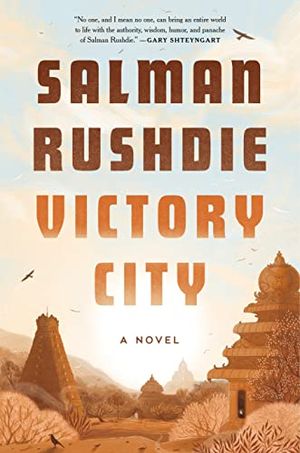In Salman Rushdie’s New Book, Stories Outlive Tyrants
‘Victory City’ comes just six months after the author survived a violent attack at a speaking event
:focal(1800x1200:1801x1201)/https://tf-cmsv2-smithsonianmag-media.s3.amazonaws.com/filer_public/98/f5/98f5e320-6844-4145-af00-5f017fd64be4/gettyimages-1171427836.jpg)
Salman Rushdie, the prolific writer behind award-winning novels such as Midnight’s Children and The Satanic Verses, is releasing a new book. It hits shelves on February 7—just six months after an assailant violently attacked him as he took a stage in Chautauqua, New York, to deliver a lecture.
Victory City, which reads like an ancient epic, tells the story of Pampa Kampana, a 9-year-old girl living in 14th-century southern India. After witnessing her mother’s death, Pampa is blessed by a goddess, who tasks her with creating a new civilization from her own imagination. She lives for more than 200 years, witnessing the highs and lows of her “victory city.”
Victory City: A Novel
The epic tale of a woman who breathes a fantastical empire into existence, only to be consumed by it over the centuries—from the transcendent imagination of Booker Prize–winning, internationally bestselling author Salman Rushdie
The book sells itself as a “testament to the power of storytelling,” a power that Rushdie has in abundance—and one he’s been targeted for. After he published The Satanic Verses in 1988, Iran’s leader, the Ayatollah Ruhollah Khomeini, issued a fatwa calling for the author’s death. Ever since, Rushdie has been subject to death threats and failed assassination attempts.
The most recent of those assassination attempts occurred on August 12, 2022 at the Chautauqua Institution in New York, where Rushdie was scheduled to speak. An assailant, later identified as 24-year-old Hadi Matar, rushed the stage and stabbed Rushdie repeatedly. The 75-year-old writer survived the attack, though he has lost sight in one eye and the use of one hand.
Rushdie wrote Victory City before the Chautauqua attack, and he has been looking forward to the novel’s publication while recovering, Colum McCann, a novelist and friend of Rushie’s, tells the New York Times’ Alexandra Alter and Elizabeth A. Harris.
“There’s a sort of fierceness of spirit that was there,” McCann says regarding his interactions with Rushdie. He describes the author’s attitude as something along the lines of, “I will use this mighty weapon of language, and it is stronger than anything you can throw at me.”
The messages baked into Victory City ring especially true in light of what Rushdie has faced in his own life, he adds.
“[Rushdie] is saying something quite profound in Victory City,” McCann tells the Times. “He’s saying, ‘You will never take the fundamental act of storytelling away from people.’ In the face of danger, even in the face of death, he manages to say that storytelling is one currency we all have.”
Reviews are beginning to trickle in, and so far they are embracing Rushdie’s latest work. Martin Chilton, the Independent’s book critic, hails it as “a vibrant, sweeping tale with a valuable message: that stories outlast tyrants and words can be the true victory.”
In a review for Time magazine, Nicholas Mancusi writes that “Rushdie’s relentless creative energy pairs well with his understanding of how history ‘works,’ and (excepting the occasional magic spell or gift of flight) this book can read almost more like a work of history than a fairy tale.”
Victory City is a “joyful oversized romp of a book, an extravagant book, showing him expressing his full capabilities and using all his creative power,” novelist Hari Kunzru, another friend of Rushdie’s, tells the Times.
“That should remind us,” Kunzru adds, “that he’s a novelist and a storyteller more than a political symbol.”
A Note to our Readers
Smithsonian magazine participates in affiliate link advertising programs. If you purchase an item through these links, we receive a commission.
